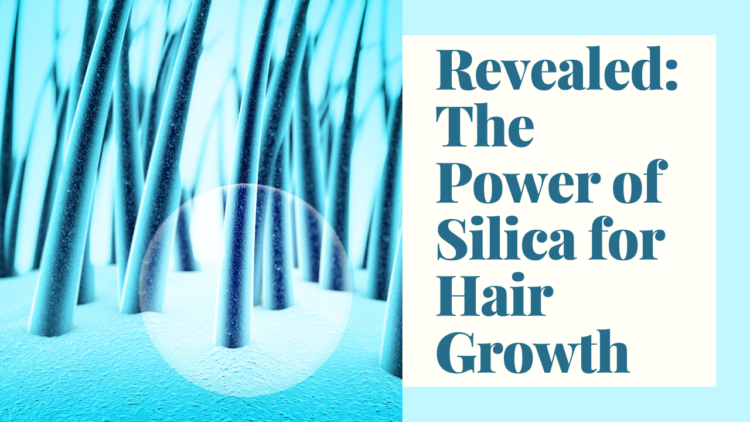Trying to improve your hair health, and give it a luxurious texture? You might be on the cutting edge of scientific research into hair if you’ve considered silica. Check out our complete guide to silica and hair growth.
What Is Silica? Why do we need it?
Necessary for human development and growth throughout your life, silica is known as a micronutrient, and is an abundant mineral found all over the Earth. You can find silica in your diet primarily in whole grains, leafy greens, and vegetables in the scallion family, like onions.
Silica helps balance other substances in our bodies, namely magnesium and calcium. Mineral and nutrient balance is key to hormone balance and feelings of well-being. Look at your calcium supplement bottle sometime. You will see that it likely contains silica!
Another important function of silica is its role in alkalizing our bodies and bolstering our immune systems. Many people get inexplicably sick when the body is too acidic internally. Silica combats this by assisting in the creation of antigens and antibodies that ward off disease. You’ll find silica in every cell; it’s a building block of the human body. It’s important to the central nervous system, heart, and – yes – even your hair!
Silica for Hair Growth? How? Why?
Simply put, development and growth of the body in general will promote healthy development and growth of hair. We lose some of our silica as we age, and thus our hair and nails aren’t as silky and healthy. If we keep our body in alkaline mode, thanks to silica, our hair’s texture and health will automatically improve. The scalp is like a magnet for acid inside the body, and this makes it the perfect place for damage, breakage, and other serious issues.
Balancing trace minerals are factors in treating hair loss, and silica is no exception to that. Vitamin D, calcium, and magnesium will produce fantastically healthy and thick hair if they are optimally balanced. Silica assists with this balance by aiding in the balanced delivery of these nutrients. This includes delivery to our hair follicles. A silica supplement can impact not just hair growth, but mood, skin, and overall well-being.
How much silica do you need?
Almost everything you ingest has a little bit of silica in it. Coffee, mineral water, lettuce, and beer all contain larger amounts. Unfortunately, the typical diet of most Americans is lower in micronutrients than it should be. Because it can reverse or treat your thinning hair, silica rich foods or supplements might be in order.
The FDA does not take a position on the optimum amount of daily silica intake, largely because it is a micronutrient and not one of the major vitamins or minerals. Recent research has shown, however, that an ideal daily intake of silica might hover around 40 mg for men, and 35 mg for women. This will depend on your diet, but it’s safe to assume you’re not getting enough.
A daily supplement of silica, usually 10 mg, is sometimes prescribed to cure a host of ills. Brittle nails, hair, and even dementia, silica deficiency can affect many parts and functions of the body. Especially being mindful of increasing your silica intake as you age, most people should be prepared to need a silica supplement at some point.
Silica in food and supplements
 If you eat a primarily meat based diet, you’re likely not getting enough silica. Silica is most abundant in plant life, and as such isn’t typically served as well in the normal American diet. If you eat your vegetables, you might get enough silica. Additionally, eating nuts, fruits, and whole grains do contain silica, but it’s not absorbed properly in the body through these foods. Supplements are the best method of insuring your silica levels are high enough, no matter what your diet consists of.
If you eat a primarily meat based diet, you’re likely not getting enough silica. Silica is most abundant in plant life, and as such isn’t typically served as well in the normal American diet. If you eat your vegetables, you might get enough silica. Additionally, eating nuts, fruits, and whole grains do contain silica, but it’s not absorbed properly in the body through these foods. Supplements are the best method of insuring your silica levels are high enough, no matter what your diet consists of.
Promoting healthy hair growth might be as simple as taking a silica supplement. An essential oil with a huge fan following, horsetail extract, is known for its high silica content. Other products, such as Viviscal, also contain this plant extract to aid and assist with hair growth. Bamboo extract is also extremely high in silica, and is often used in place of or with horsetail plant extract.
Don’t Forget!
You need to consult a medical professional before undertaking any new hair growth plan, including one that adds supplements or oils to your diet. If you are diabetic or prediabetic, you should be aware that silica can lower your blood sugar levels. If you are prone to swings, this might be potentially harmful. Silica is also known for its diuretic properties, so make sure to stay hydrated and not supplement with other diuretics.
If you want to boost your hair growth with other solutions, Viviscal is a hair growth vitamin that contains zinc, biotin, and iron. These nutrients are also crucial to maintaining and growing healthy hair, and for extending the hair growth cycle in the right phases for increasing longevity of your hair growth. Viviscal contains a special AminoMar marine complex that other vitamins lack, and it has been proven time and time again to result in fuller and thicker hair for women. Essential oils and topical creams might also be necessary on your path to beautiful, reinvigorated hair. But silica is a great first step, and fun to learn about in the process!



Comments are closed.